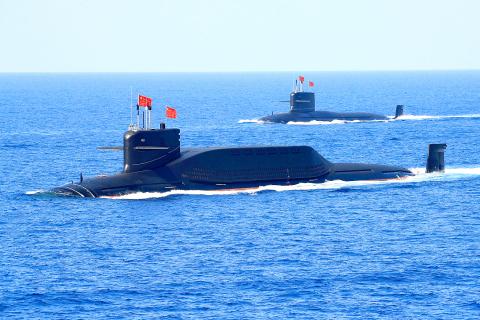China could use force to push Taiwan into unification or into unification dialogue, the Pentagon said in its annual military report on China issued on Thursday.
In the report submitted to the US Congress, the Pentagon said that China is likely to pursue a measured approach by demonstrating its readiness to use force or take punitive actions against Taiwan.
“The PLA [Chinese People’s Liberation Army] could also conduct a more comprehensive campaign designed to force Taiwan to capitulate to unification, or unification dialogue, under China’s terms,” the report said.

Photo: Reuters
Taiwan remains the PLA’s main strategic direction and serves as one of the geographic areas Beijing identifies as having strategic importance, it said.
“China’s overall strategy toward Taiwan continues to incorporate elements of both persuasion and coercion to hinder the development of political attitudes in Taiwan favoring independence,” the Pentagon said.
However, the analysis appeared to downplay prospects for a large-scale amphibious invasion, saying that it could strain China’s armed forces and invite international intervention.
It also noted the possibility of limited missile strikes.
“China could use missile attacks and precision airstrikes against air defense systems, including air bases, radar sites, missiles, space assets and communications facilities, to degrade Taiwan’s defenses, neutralize Taiwan’s leadership or break the Taiwan people’s resolve,” the report said.
Taiwan has much smaller military capabilities than China and the gap is growing, it added.
According to its estimate, China has 2,600 fighter jets, including 1,100 fighter trainers, while Taiwan has only 450.
China also has 450 transport planes, 450 bombers and 150 special mission aircraft, while Taiwan deploys only 30 transport planes and 30 special mission aircraft, and has no bombers, the Pentagon said.
While China speaks of peaceful unification, its government has never given up the use of force as an option and continues to develop and deploy advanced military capabilities, paving the way for a potential military campaign to increase pressure on Taipei, the report said.
In the event of a protracted conflict, China might resort to escalating cyberspace, space or nuclear activities, it said, adding that it might alternatively choose to fight to a standstill and pursue a political solution.
The Pentagon said that the US supports a peaceful resolution of Taiwan-China issues, and under the Taiwan Relations Act, would contribute to peace, security and stability in the Taiwan Strait by providing defense articles and services to help Taiwan maintain adequate self-defense capability.
It added that “Taiwan has stated that it is working to develop new concepts and capabilities for asymmetric warfare.”
Ministry of National Defense spokesman Major General Chen Chung-chi (陳中吉) said in Taipei that the ministry would continue its observations and called on Taiwanese to trust in the military’s resolve and confidence to protect the nation.
The military would treat President Tsai Ing-wen’s (蔡英文) comment that “not an inch of sovereign land will be yielded, nor will we abandon our democracy and liberties” as its prime directive and would establish training regimens accordingly, Chen added.
Additional reporting by Reuters and staff writer

CHAOS: Iranians took to the streets playing celebratory music after reports of Khamenei’s death on Saturday, while mourners also gathered in Tehran yesterday Iranian Supreme Leader Ayatollah Ali Khamenei was killed in a major attack on Iran launched by Israel and the US, throwing the future of the Islamic republic into doubt and raising the risk of regional instability. Iranian state television and the state-run IRNA news agency announced the 86-year-old’s death early yesterday. US President Donald Trump said it gave Iranians their “greatest chance” to “take back” their country. The announcements came after a joint US and Israeli aerial bombardment that targeted Iranian military and governmental sites. Trump said the “heavy and pinpoint bombing” would continue through the week or as long

TRUST: The KMT said it respected the US’ timing and considerations, and hoped it would continue to honor its commitments to helping Taiwan bolster its defenses and deterrence US President Donald Trump is delaying a multibillion-dollar arms sale to Taiwan to ensure his visit to Beijing is successful, a New York Times report said. The weapons sales package has stalled in the US Department of State, the report said, citing US officials it did not identify. The White House has told agencies not to push forward ahead of Trump’s meeting with Chinese President Xi Jinping (習近平), it said. The two last month held a phone call to discuss trade and geopolitical flashpoints ahead of the summit. Xi raised the Taiwan issue and urged the US to handle arms sales to

State-run CPC Corp, Taiwan (CPC, 台灣中油) yesterday said that it had confirmed on Saturday night with its liquefied natural gas (LNG) and crude oil suppliers that shipments are proceeding as scheduled and that domestic supplies remain unaffected. The CPC yesterday announced the gasoline and diesel prices will rise by NT$0.2 and NT$0.4 per liter, respectively, starting Monday, citing Middle East tensions and blizzards in the eastern United States. CPC also iterated it has been reducing the proportion of crude oil imports from the Middle East and diversifying its supply sources in the past few years in response to geopolitical risks, expanding

Pro-democracy media tycoon Jimmy Lai’s (黎智英) fraud conviction and prison sentence were yesterday overturned by a Hong Kong court, in a surprise legal decision that comes soon after Lai was jailed for 20 years on a separate national security charge. Judges Jeremy Poon (潘兆初), Anthea Pang (彭寶琴) and Derek Pang (彭偉昌) said in the judgement that they allowed the appeal from Lai, and another defendant in the case, to proceed, as a lower court judge had “erred.” “The Court of Appeal gave them leave to appeal against their conviction, allowed their appeals, quashed the convictions and set aside the sentences,” the judges